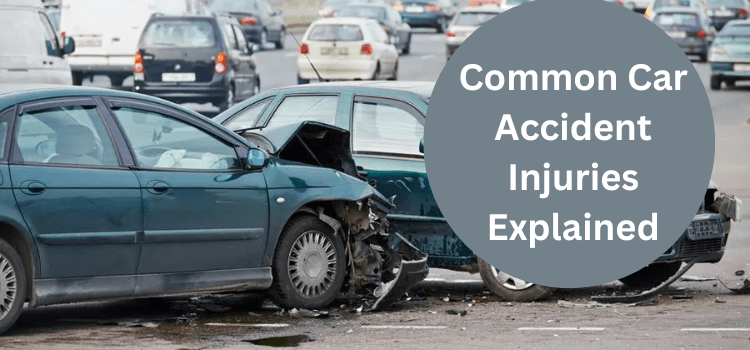Car accidents are a common occurrence on roads worldwide, and they can have devastating consequences for those involved. One of the most immediate and impactful outcomes of a car crash is physical injury. From minor bruises to severe trauma, car accident injuries vary widely in their severity and implications. In this blog post, we will delve into some of the most common car accident injuries, exploring their causes, symptoms, treatments, and long-term effects.

Head Injuries:
One of the most concerning types of car accident injuries is head trauma. Head injuries can range from minor concussions to severe traumatic brain injuries (TBIs). The force of impact during a collision can cause the head to strike against the steering wheel, dashboard, or window, leading to injuries such as contusions, lacerations, or skull fractures.
Symptoms of head injuries may include headaches, dizziness, nausea, confusion, or loss of consciousness. In severe cases, TBIs can result in long-term cognitive impairments, memory loss, or even permanent disability. Prompt medical attention is crucial to assess and manage head injuries effectively.
Neck and Back Injuries:
Whiplash is a common neck injury sustained in car accidents, particularly rear-end collisions. It occurs when the head is forcefully jerked backward and then forward, straining the muscles and ligaments in the neck. Symptoms of whiplash may include neck pain, stiffness, headaches, and limited range of motion.
While whiplash often resolves with conservative treatments such as rest, ice, and physical therapy, some individuals may experience chronic pain or complications. Back injuries, including spinal fractures, herniated discs, or sprains, can also occur during car accidents, leading to persistent pain and mobility issues.
Chest Injuries:
The impact of a car crash can cause occupants to collide with the steering wheel, dashboard, or seatbelt, resulting in chest injuries. These injuries may include bruising, rib fractures, or damage to internal organs such as the lungs or heart.
Even minor chest injuries can be painful and may require a medical evaluation to rule out more severe underlying damage. In cases of severe chest trauma, such as a punctured lung or cardiac contusion, immediate medical attention is essential to prevent life-threatening complications.
Abdominal Injuries:
Blunt force trauma to the abdomen during a car accident can cause injuries to internal organs such as the liver, spleen, or kidneys. These injuries may not always be apparent immediately following the crash but can lead to internal bleeding or organ damage if left untreated.
Symptoms of abdominal injuries may include pain, swelling, tenderness, or bruising. Prompt medical assessment, often through imaging studies such as CT scans or ultrasounds, is crucial to diagnose and manage abdominal trauma effectively.
Limb Injuries:
Fractures, sprains, and lacerations to the arms and legs are common in car accidents, especially in instances where occupants are thrown against hard surfaces or crushed by debris. Fractures may range from minor hairline cracks to complex compound fractures requiring surgical intervention.
Additionally, soft tissue injuries such as sprains or strains can result in pain, swelling, and limited mobility. Prompt immobilization and medical treatment are necessary to prevent further damage and promote proper healing of limb injuries.
Psychological Injuries:
In addition to physical injuries, car accidents can also have profound psychological effects on those involved. The emotional trauma resulting from a crash can lead to symptoms of anxiety, depression, post-traumatic stress disorder (PTSD), or phobias related to driving or being in a vehicle.
It is essential for individuals experiencing psychological distress after a car accident to seek support from mental health professionals who can provide counseling, therapy, or other interventions to address their needs effectively.
Conclusion
Car accidents encompass a broad spectrum of consequences, often involving physical injuries of different severities and complexities. From head trauma to psychological distress, the repercussions of a car crash can transcend the immediate collision. It’s imperative to grasp the typical car accident injuries and their ramifications to foster awareness, prevent future incidents, and manage current ones effectively.
Whether individuals require medical attention, rehabilitation, or emotional support, prioritizing their health and well-being following a crash is paramount. In the aftermath of an accident, seeking legal guidance, such as from a car accident lawyer in Provo, can also be crucial for navigating potential legal complexities and ensuring proper compensation and protection of rights.






Leave a Reply